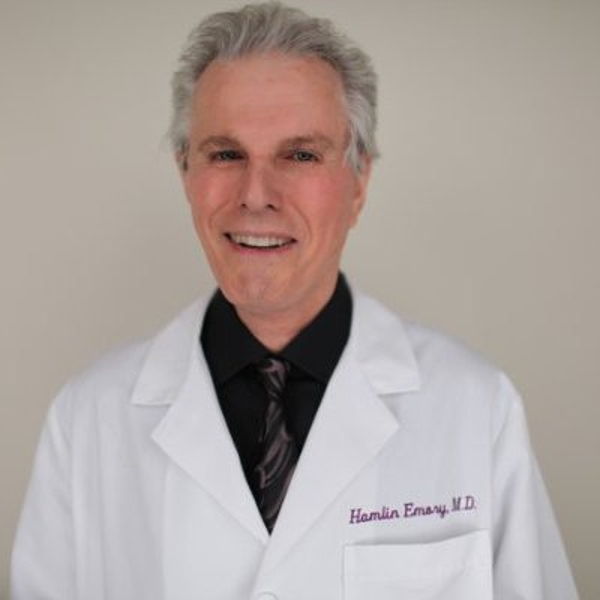
-
course Info -
Content -
Ce Approvals -
Policies
When Using A One-Size Assessment Doesn't Fit All Panel Discussion
Learning Objectives
Discuss structural and institutional manifestations of racism and the impact of our internal biases on clinical assessments. Discuss the gaps in marginalized populations from research findings in populations with eating disorders. Recall how advances in treatment-resistant depression and brain stimulation technologies may impact clinical assessments. Explain how using EEGs and QEEGs can reveal key physiological and neurological elements of a psychiatric assessment.
Learning Levels
Beginner Intermediate
Course Instructor(s)
-
 Nolan Williams, MDDirector of the Stanford Brain Stimulation Lab and Assistant Professor within the Department of Psychiatry and Behavioral Sciences
Nolan Williams, MDDirector of the Stanford Brain Stimulation Lab and Assistant Professor within the Department of Psychiatry and Behavioral SciencesDr. Williams is an Assistant Professor within the Department of Psychiatry and Behavioral Sciences and the Director of the Stanford Brain Stimulation Lab. Dr. Williams has a broad background in clinical neuroscience and is triple board-certified in general neurology, general psychiatry, as well as behavioral neurology & neuropsychiatry.
In addition, he has specific training and clinical expertise in the development of brain stimulation methodologies. Themes of his work include (a) examining the use of spaced learning theory in the application of neurostimulation techniques, (b) development and mechanistic understanding of rapid-acting antidepressants, and (c) identifying objective biomarkers that predict neuromodulation responses in treatment-resistant neuropsychiatric conditions.
He has published papers in high-impact peer-reviewed journals including Brain, American Journal of Psychiatry, and the Proceedings of the National Academy of Science. Results from his studies have gained widespread attention in journals such as Science and New England Journal of Medicine Journal Watch as well as in the popular press and have been featured in various news sources including Time, Smithsonian, and Newsweek. Dr. Williams received two NARSAD Young Investigator Awards in 2016 and 2018 along with the 2019 Gerald R. Klerman Award. Dr. Williams received the National Institute of Mental Health Biobehavioral Research Award for Innovative New Scientists in 2020.
-
 Hamlin Emory, MDPioneer & specialist in applying EEG & QEEG data to the treatment of each patient.
Hamlin Emory, MDPioneer & specialist in applying EEG & QEEG data to the treatment of each patient.Dr. Hamlin Emory is recognized as a pioneer and specialist in applying EEG & QEEG data to the treatment of each patient. He is devoted to helping persons improve their physical health and achieve wellness through personalized treatment. Dr. Emory has extensive clinical experience in general medicine and psychiatric medicine. He has served as director of psychiatric programs for adolescents and adults, and as medical director of several psychiatric hospitals and residential treatment centers for eating disorders and substance dependence in the Los Angeles, California area.
Specialty: Adolescent and Adult Neuropsychiatry Sub-specialty: Neuropsychiatry & Neuro-Physiologic Medicine Faculty: Assistant Clinical Professor, Semel Institute, David Geffen School of Medicine at UCLA
Education/Training: Undergraduate: Washington and Lee University, Lexington, Virginia, B.A., 1959-1963 Medical: University of Virginia School of Medicine, Charlottesville, Virginia, M.D., 1963-1967 Graduate: Naval Aerospace Medicine Institute, Pensacola, Florida, Flight Surgeon, 1968-1969 Internship-Surgery: Vanderbilt University, Medical Center and Hospital, Nashville, Tennessee, 1967-1968 Flight Surgeon, U.S. Navy: 1st Marine Air Group, Republic of South Vietnam; 1969-1970 Chief Medical Officer: Naval Air Station, NATO Base, Sigonella, Sicily, 1970-1972 Residency in Adult Psychiatry: University of California, Los Angeles, Brentwood Veterans Administration Hospital, Los Angeles, California, 1972-1974 Fellowship in Child Psychiatry: Neuropsychiatric Institute, UCLA School of Medicine, 1974-1976
Board Certification: Psychiatry & Neurology - Psychiatry Professional Affiliations: American Medical Association American Psychiatric Electrophysiology Society American Psychiatric Association So. California Psychiatric Society American Neuropsychiatric Association Reviewer for "Clinical EEG and Neuroscience", the official journal of the EEG and Clinical Neuroscience Society.
Dr. Emory collaborates with physicians across medical specialties. He also teaches psychiatrists, internists, family physicians, neurologists and addiction medicine physicians how to employ his neuro-integrative approach in their clinical practices.
-
 Norman Kim, PhDRecipient of an individual National Research Service Award from the National Institutes of Health
Norman Kim, PhDRecipient of an individual National Research Service Award from the National Institutes of HealthNorman completed his B.A. at Yale University where he studied music and psychology, and was the recipient of a Mellon Fellowship for Research in Psychiatry. He completed his Ph.D. in Clinical Psychology at UCLA, where he was the recipient of an individual National Research Service Award from the National Institutes of Health to study the neurobiologic underpinnings of emotion recognition and understanding in Autism. Most recently he has been involved in a multi-site, longitudinal study of children and adolescents at risk for developing bipolar disorder.
In conjunction with his research, Norman has developed an expertise in treating and teaching about psychiatrically complex populations, multi-modal treatment, and diagnostic assessment. While rooted firmly in empirically supported approaches, he has incorporated practices emphasizing somatosensory integration and that draw from eastern and traditional medicine with our current knowledge of the neurobiologic and cognitive processes underlying anxiety, mood, trauma and eating disorders. He has endeavored to develop a clinical approach that focuses on the exploration of meaning as a path to healing and that honors an individual’s’ own narrative and journey.
Norman is a frequent, national speaker and educator, and is a passionate advocate for eating disorder awareness and translating research into clinical practice. He was the co-founder of the Reasons Eating Disorder Center and is a regular national speaker, educator, and advocate for eating disorder awareness. He is on the Board of Directors of the Eating Disorders Coalition, the Eating Disorder Advisory Council for the Joint Commission, and the Clinical Advisory Boards for Recovery Warriors, Spectrum CBT, and Tikvah V’Chizuk. He is the National Director for Program Development for Reasons Eating Disorder and Center for Change.
Disclosure
References
Bentzley, B. S., Pannu, J., Badran, B. W., Halpern, C. H., & Williams, N. R. (2017). It takes time to tune. Annals of Translational Medicine, 5(7). Cénat, J. M. (2020). How to provide anti-racist mental health care. The Lancet Psychiatry, 7(11), 929-931. Cole, E. J., Stimpson, K. H., Bentzley, B. S., Gulser, M., Cherian, K., Tischler, C., ... & Williams, N. R. (2020). Stanford accelerated intelligent neuromodulation therapy for treatment-resistant depression. American Journal of Psychiatry, 177(8), 716-726. Emory, W. H., Shatsky, M. L., & Wells, C. G. (2011). EEG and Quantitative EEG Data as an Adjunct to Clinical Assessment Predicts Response to Atypical Treatment Options. Journal of Neuropsychiatry and Clinical Neurosciences, 23(2), 8. Farahmand, P., Arshed, A., & Bradley, M. V. (2020). Systemic racism and substance use disorders. Psychiatric Annals, 50(11), 494-498. Fortuna, L. R., Al-Mateen, C. S., Cullins, L. M., Lohr, W. D., Slack, J., Gaines, P., ... & Zhen-Duan, J. (2022). Addressing Systemic Racism and Disparate Mental Health Outcomes for Youth of Color. Child and Adolescent Psychiatric Clinics of North America, 31(2), i. Labarta, A. C., & Bendit, A. (2023). Culturally Responsive and Compassionate Eating Disorder Treatment: Serving Marginalized Communities with a Relational-Cultural and Self-Compassion Approach. Journal of Creativity in Mental Health, 1-11. Tendler, A., Sisko, E., Rodriguez, N., Corbett-Methot, S., Sutton-DeBord, J., Brown, J., & Williams, N. (2018). Sequential L-PFC, dmPFC-ACC, accelerated intermittent theta burst dTMS for suicidal highly treatment resistant depression patients. Brain Stimulation: Basic, Translational, and Clinical Research in Neuromodulation, 11(3), e2.
CE Process Info
Content
-
Video Training1 parts
-
Video Instruction - When Using A One Size Assessment Doesn't Fit All
-
CE Approvals
-
American Psychological Association (APA)
CE Learning Systems, LLC is approved by the American Psychological Association to sponsor continuing education for psychologists. CE Learning Systems maintains responsibility for this program and its content.
-
New York State Education Department's State Board for Social Work (NYSEDSW)
CE Learning Systems SW CPE is recognized by the New York State Education Department's State Board for Social Work as an approved provider of continuing education for licensed social workers #0060.
-
New York Education Department for Licensed Mental Health Counselors (NYSEDLMHC)
CE Learning Systems, LLC is recognized by the New York State Education Department's State Board for Mental Health Practitioners as an approved provider of continuing education for licensed mental health counselors. #MHC-0072.
-
New York State Education Department's State Board for Psychology (NYSEDPSY)
CE Learning Systems dba CE-Credit.com & AddictionCounselorCE.com is recognized by the New York State Education Department's State Board for Psychology as an approved provider of continuing education for licensed psychologists #PSY-0016.
-
New York State Education Department's State Board for Marriage and Family Therapy (NYSEDMFT)
CE Learning Systems dba CE-Credit.com & AddictionCounselorCE.com is recognized by the New York State Education Department's State Board for Marriage and Family Therapy as an approved provider of continuing education for licensed marriage and family therapists #MFT-0045.
FAQs
-
Course CompletionTo complete the course, review the course objectives, then review the material, and then pass the exam with a score of 70% or greater and lastly complete an evaluation. Your certificate will be available to download immediately when you pass the course exam and complete the evaluation.
-
CELS GrievanceIf a grievance arises pertaining to continuing education activities or processes, please contact Tyler Gibson via confidential email to tyler@celearningsystems.com as soon as possible, so that the nature of the concern may be addressed in a timely fashion.
-
Disability AccomodationsADA accommodations will be made in accordance with the law; please indicate your special needs prior to registering for the course by sending an email to support@ce-go.com or by calling us at 888 498 5578.
-
Target AudienceThis educational activity is intended for behavioral health professionals, including Psychologists, Social Workers, Counselors, and MFT's.

-
CE Hours 1 -
Type Self-Paced -
Publication Date Jun 6th, 2023
Reset password
We sent a reset password link to the email address you provided.
{{reset.email}}
If you do not see the email, try checking your junk or spam folder.
If you don't receive a link in the email you provided, please click the button below to resend the
verification email.
Please wait {{timer}} seconds to resend
Sign in
Sign in
Thanks for signing up!
We sent an verification email to the address you provided. Please check your email to verify your email address.
{{signup.email}}
If you do not see the email, try checking your junk or spam folder.
If you don't receive a link in the email you provided, please click the button below to resend the verification email.
Please wait {{timer}} seconds to resend
Sign up
Shopping Cart
-
{{ item.name }}
{{ item.credit_hours }} Credits
{{ item.coupons.map((c)=> c.code).join(', ') }}${{ item.totals.total_price }}${{ item.totals.price }}
Cart is empty
Thank you for your purchase
To access the course content, click the button below. Enrolled courses may be accessed at any time by going to your Account and clicking Courses
